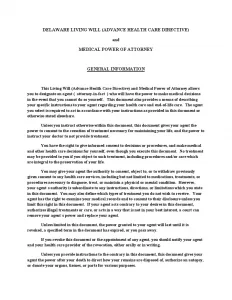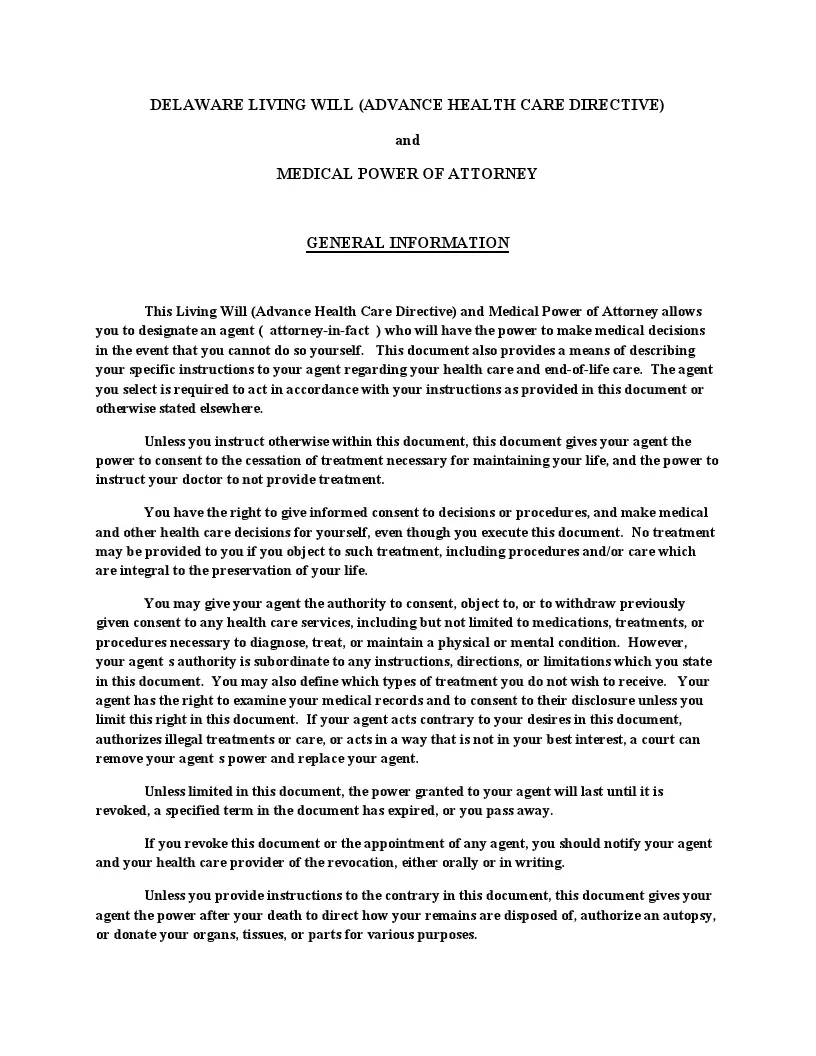Free Delaware Living Will Form
A living will, also known as an Advance Health Care Directive, is a legal document that outlines your wishes regarding medical treatment in situations where you cannot communicate those decisions yourself. In Delaware, the specifics of creating and executing a living will are governed by state law.
You must sign the living will form in the presence of two adult witnesses who are not related to you, beneficiaries of your estate, or financially responsible for your medical care. Alternatively, the document can be notarized. Health care providers must follow the wishes expressed in the Delaware living will, provided the document and its execution comply with state law. This document becomes effective when you are determined to be incapacitated and unable to communicate your health care decisions.
Signing Requirements and Laws
Creating a legally valid living will in Delaware requires adherence to specific signing requirements and laws outlined in the Delaware Code, Title 16, Chapter 25 (Health Care Decisions). Ensuring your living will meets these legal standards is crucial for its enforceability.
To create a living will in Delaware, you must be at least 18 years old and of sound mind. The document should clearly outline your health care preferences, particularly life-sustaining treatments and end-of-life care. You also have the option to appoint a health care agent to make decisions on your behalf if you become incapacitated.
According to § 2503 of the Delaware Code, the declarant (the person creating the document) must sign the living will. The signature must be witnessed by two qualified adults or notarized. The witnesses must meet specific criteria to ensure impartiality:
- They must be at least 18 years old.
- They should not be related to the declarant by blood, marriage, or adoption.
- They must not be entitled to any portion of the declarant’s estate upon death.
- They should not be financially responsible for the declarant’s medical care.
The document can be notarized instead of having two witnesses. Notarization provides an added layer of authenticity and can simplify the verification process for health care providers. As per § 2507 of the Delaware Code, the declarant can revoke a living will at any time, provided they are of sound mind. Revocation can be done through a written statement, verbally, or by any action indicating the intent to revoke, such as destroying the document. The revocation becomes effective once communicated to the health care provider or agent.
Delaware Living Will Form Details
| Document Name | Delaware Living Will Form |
| State Form Name | Delaware Advance Health Care Directive |
| Signing Requirements | Two Witnesses or Notary Public |
| Validity Requirements | Section 2503 |
| Powers Limitation | Section 2507 |
| State Laws: Delaware Code, Title 16, Chapter 25 | |

Steps to Fill Out the Form
Filling out a Delaware living will form ensures that your health care preferences are respected if you become unable to communicate them yourself. Here’s how to complete the form accurately.
1. Provide Personal Information
Begin by filling in your full name and the name of the county in Delaware where you reside. This establishes your identity and place of residence.
2. Designate an Agent
In Part 1, you can appoint a health care agent. This individual will make health care decisions on your behalf. Provide the name, address, and phone number of your primary agent. If desired, you can also designate additional or successor agents. Indicate whether the agents should act in succession, independently, or jointly by initialing the appropriate option.
3. Specify Agent’s Authority
Initial the boxes that specify the authority you are granting to your agent, such as providing for your admission to a health care facility, consenting to medical procedures, arranging pain-relieving drugs, or consenting to psychiatric treatment. Indicate when the agent’s authority becomes effective, either immediately or upon a physician’s determination that you lack capacity.
4. End-of-Life Decisions
In Part 2, you can communicate your wishes regarding end-of-life care under specific conditions like terminal illness, permanent unconsciousness, or serious illness/frailty. For each condition, read the options carefully and initial your choice. You may choose to have your agent make decisions, to prolong life or not to prolong life, specifying any treatments you do or do not want.
5. Comfort Care Preferences
Regardless of your end-of-life choices, indicate whether you wish to be treated to relieve pain or provide comfort by initialing the appropriate choice.
6. Additional Medical Instructions
Provide any additional medical instructions not covered in the previous sections. This field can include specific treatments or procedures you do or do not want.
7. Anatomical Gift Declaration
In Part 3, specify if you wish to make anatomical gifts of your body, organs, or tissues upon death. Indicate your choices and the purposes for which the anatomical gifts may be used.
8. Administrative Provisions
Sign and date the document on the page titled “Administrative Provisions.” Two qualified individuals who meet the criteria outlined in the form must witness your signature. These witnesses must also sign the “Statement of Witnesses” section.

Below are various other Delaware templates completed by our users. Try our simple builder to customize these forms to your preferences.
